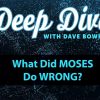The first thing we need to note about Mary’s response to the announcement by the angel Gabriel that she would have a child is that although she was probably no older than 14, she was no naive child. She knew what it took to have a baby, and so she immediately proclaimed, “How can this be, since I am a virgin?” Gabriel responds by telling her that the conception will be miraculous by the power of the Holy Spirit.
I doubt that Mary had any idea what that meant — just as we cannot fully understand it today — but nonetheless, knowing it would highly complicate her life and her relationship with Joseph, she responded, “I am the Lord’s servant, so do to me as you please.” That, my friends, was an incredibly brave statement of faith.
But Mary’s response is not the only evidence of her innocence. Further evidence can be found in Luke’s account. Let’s continue reading:
39 Without delay, Miryam set out and hurried to the town in the hill country of Y’hudah
40 where Z’kharyah lived, entered his house and greeted Elisheva.
41 When Elisheva heard Miryam’s greeting, the baby in her womb stirred. Elisheva was filled with the Ruach HaKodesh
42 and spoke up in a loud voice, “How blessed are you among women! And how blessed is the child in your womb!
43 “But who am I that the mother of my Lord should come to me?
44 “For as soon as the sound of your greeting reached my ears, the baby in my womb leaped for joy!
45 “Indeed you are blessed, because you have trusted that the promise Adonai has made to you will be fulfilled.”
Notice that the innocence of Mary is attested to over and over again in these particular verses. For example, the first thing they tell us is that Mary ran to a relative, Elizabeth, to share with her the good news of her pregnancy. Let me ask you, how many pregnant unwed girls have you ever seen behave in that manner? They are normally overwhelmed with shame, and the last people they want to know about their situation are their relatives!
And her innocence is further confirmed by the fact that she chose a priestly family to share the news with! The significance of this is that Elizabeth’s husband, Zacharias, was a priest. If Mary were pregnant by fornication, it would have been the responsibility of Zacharias to report her and have her tried and stoned to death.
I think Mary’s innocence is also confirmed by the reaction of Elizabeth when she cried out “Blessed are you among women, and blessed is the fruit of your womb!” She did that before Mary could even tell her the purpose of her visit!
The passage says she did it under the anointing of the Holy Spirit. In other words, Elizabeth was given a supernatural word of knowledge, and this must have served as a confirmation to Mary of the message that Gabriel had given her.
And further confirmation is supplied by John the Baptist who at that time was still in the womb of his mother, Elizabeth. He began to leap with joy in his mother’s womb when Mary arrived, because he sensed the presence of the Messiah!
What other clues do the Scriptures give us that show Mary was innocent? We’ll look at them and some of the world’s objections in the next installment of this “Truth of the Virgin Birth” series.








question: was the virgin birth a double fulfillment? 1st in ahaz`s time (isa 7) then with jesus?
Hardawg
Double fulfilment?
Midrash works that if you asked a Rabbi ‘is this prophecy past, present or future’ he would reply ‘Yes’. He means what is; has been and will be again.
BUT
In Footsteps of the Messiah, Arnold Fruchtenbaum mentions Isaiah 7 in an example of ‘The Rules of Interpretation’. The 2nd law is called ‘The Law of Double Reference’ which observes that a passage or a block of Scripture speaks of two different persons or two different events separated by a long period of time.
Arnold doesn’t accept the idea of ‘double fulfilment’ and says it shouldn’t be confused with the ‘Law of Double Reference’. A single passage refers to only one thing, unless stated otherwise, and if it is prophecy, it can only have one fulfilment unless the text itself states that it can have many fulfilments.
Isaiah7:14 must either refer to a child in Ahaz’s day OR to the birth of Messiah. It cannot refer to both. Isaiah 13-17 is better explained as following ‘The Law of Double Reference’ NOT ‘Double Fulfilment’. Vs.13-17 refers to the birth of the Messiah ONLY.
These verses are to the ‘House of David’ in general. This is seen in the use of plural pronouns in these two verses in the Hebrew text. Vs 15-17 refer to a child in Ahaz’s day because it is addressed to Ahaz alone. This is seen in the shift to singular pronouns in the Hebrew text. Arnold says the child in question is probably Shear-Yashuv of vs three.
This is the double reference of two persons separated by a period of time. It avoids the pitfalls of double fulfilment ( regarding a virgin birth in the O.T.)
I haven’t copied word for word, just the sense of it. Hope it helps?
God bless
double reference not double fulfillment, that makes sense. that being the case would the abomination of deselation be double reference or double fulfillment? (antiochus epihiny and anti-christ) and what about daniel 8? speaking of antiochus AND anti-christ or antiochus OR anti-christ? double reference or double fulfillment?
daniel 8 cant be speaking bout only antiochus cuz "it concerns the time of the end" and "in the time of wrath" yet it cant be only antichrist cuz antiochus fulfilled all the prophecies. so double reference or double fulfillment? and same with king of tyre. mentions literal king AND lucifer. tuff to tell.
by the way king of tyre is in ezekiel not daniel.
Hartdawg
From my extremely limited understanding, from reading AF; I would say it is double REFERENCE.
The King and the Prince of Tyre are two separate personalities in different times AND space. Antiochus and ant-ichrist are different individuals, similar but not identical, again time parts them.
They are used as 'types'or examples of what to look out for, expect and explain (especially the Jews during the Trib). imo